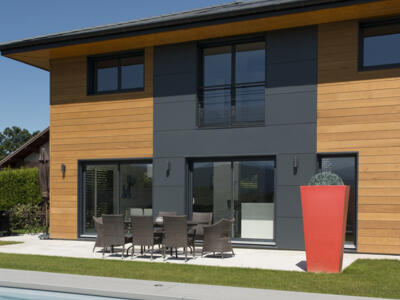Concerned about the environment, the timber industry is committed to an eco-responsible industrial approach, favouring sustainable species and selecting them rigorously to preserve the forests. The timber industry is taking the path of ecological transition with quality labels, standards and increasingly controlled regulations to limit deforestation.
The timber industry's eco-responsible industrial approach is reflected in the adoption and application of various quality labels. Of the ten or so worldwide, two are benchmarks for professionals, grouped together under the FLEGT regulations: PEFC certification and FSC certification. These two labels protect the planet's forests and biodiversity. They prevent the unsustainable or even illegal exploitation of certain exotic species of forest.
Two references for professionals
These wood labels are an environmental necessity. Both certifications are based on the principles of sustainable forest management: soil protection, ecosystem balance, maintaining forest productivity and economic viability through replanting to compensate for felling, respect for the rights of indigenous populations to ownership, use and management of land resources, and the well-being of forest workers. All these elements contribute to an eco-responsible approach to the timber industry.
The FSC (Forest Stewardship Council) label, created by an international NGO (Greenpeace) in 1993, is awarded to processing companies for the traceability of products and the origin of species. Certification procedures remain fairly demanding. They are based on a set of 11 principles to be respected in three areas: economic, social and environmental. Companies are certified for 5 years and are subject to at least one annual audit.
The second label is PEFC (Pan European Forest Certification). Created in 1998, this label guarantees that wood material comes from sustainably managed forests according to rules precisely defined region by region. More than 8 million hectares of forest are PEFC certified in France, and more than 3,000 companies use wood or products made from it. Sivalbp is one of them.
Sivalbp, an eco-responsible industrial approach and commitment
When it comes to an eco-responsible industrial approach, the Haute-Savoie-based company Sivalbp is a star performer. It selects quality species and ensures that its wood comes exclusively from responsibly managed, PEFC-certified forests. It chooses its suppliers carefully, taking into account their forestry and industrial methods.
It is the perfect embodiment of this commitment to eco-responsibility, through its initiatives and expertise in its transformation processes and techniques. The site where the wood is received and processed 100% naturally is eco-designed to ensure energy self-sufficiency. Production energy requirements are met from renewable sources. As part of its eco-responsible industrial approach, Sivalbp recovers rainwater, fuels a 4MW wood-fired boiler by recycling its by-products, and the buildings are oriented to optimise natural air conditioning. In addition to the site, the secondary wood transformation processes comply with 100% responsible principles to deliver products with a clean ecological balance. This mastery of the combination of species and processes makes it possible to offer a vast range of technical and aesthetic boards with high quality standards.








